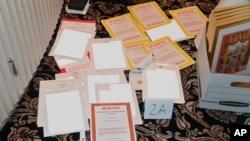Former U.S. President Donald Trump confirmed Thursday that he has been indicted in connection with his handling of classified documents after he left the White House in 2021.
The indictment has not been made public but Trump attorney James Trusty, appearing on the cable news channel CNN, said the charges include willful retention of “national defense information,” obstruction, false statements and conspiracy.
The indictment makes Trump the first former U.S. president to be charged in federal court.
He has already been charged in New York with paying off an adult film star during his 2016 presidential election. He is also under scrutiny from federal and state prosecutors in Georgia for attempting to overturn the 2020 presidential election.
Here are seven questions about the documents case.
Why was Trump being investigated?
The Justice Department launched an investigation into Trump’s handling of government records in early 2022 after the National Archives reported that Trump had stashed hundreds of sensitive government documents at his Florida resort and obstructed their retrieval.
Under U.S. law, presidential records belong to the government and must be handed over to the National Archives when a president leaves office.
Trump allegedly took hundreds of records from the White House and had them shipped to Mar-a-Lago, his Florida resort and residence.
The National Archives demanded the documents from Trump’s representatives in 2021 but only received 14 boxes in January 2022. They contained more than 100 classified documents.
Alarmed at the finding of government secrets, the National Archives subsequently reported the discovery to the Justice Department, triggering an FBI investigation.
Though Trump later returned several dozen more documents, investigators suspected he was holding on to even more. That led the FBI to execute a search of Mar-a-Lago in August 2022. The highly publicized search led to the discovery of more than 100 classified documents.
What is in the documents?
In all, prosecutors have retrieved more than 300 classified government documents from Trump. The documents bear various classification markings, from confidential and secret to top secret/sensitive compartmentalized information, the highest level of classification.
The government has kept the content of the classified records under wraps, but in court documents, prosecutors have said their mishandling could endanger U.S. national security.
The documents originate from different agencies, including the CIA, the FBI and the National Security Agency, and cover a broad spectrum of national security topics, such as China and Iran's missile program.
Why did a special counsel investigate the case?
The investigation was led through most of last year by the Justice Department. But Trump's announcement in November that he was running for president again prompted Attorney General Merrick Garland to appoint Jack Smith, a former career Justice Department prosecutor, as special counsel.
Smith used two grand juries in recent months — one in Washington and another in Miami — to subpoena witnesses and documents related to the case. Several dozen witnesses have appeared before the two panels.
Smith is also investigating Trump in connection with the events that led to the Jan. 6, 2021, attack on the U.S. Capitol.
What has Trump said publicly about the case?
Trump has denied any wrongdoing in connection with the documents, calling the investigation a "witch hunt" designed to sabotage his bid for reelection.
He also claimed that he had a "standing order" to declassify all documents taken from the Oval Office to the White House residence.
But prosecutors have reportedly obtained a 2021 audio recording in which Trump acknowledged he had retained a classified Pentagon document, which contradicts his claim that he had declassified all documents.
What would an indictment mean for Trump's presidential run?
Legally, the federal indictment cannot stop him from forging ahead with his presidential campaign.
In fact, John Malcolm, a former federal prosecutor who is a vice president at the Heritage Foundation, said there are no laws that would prevent Trump from running, even if he is convicted.
"There have been people who have run for office from prison cells," Malcolm said.
In 2002, former Representative Jim Traficant ran for his old congressional seat while serving a prison sentence for corruption.
How do the Trump and Biden document cases compare?
Trump’s indictment comes as another special counsel, Robert Hur, investigates President Joe Biden’s handling of classified records dating back to his time as vice president.
The documents were found last year at Biden’s former Washington office and his home in Delaware.
Biden’s lawyers have said the documents, small in number, were handed over to government officials as soon as they were found.
Even if Biden were found to have mishandled classified documents, he would be unlikely to face charges.
That is because of a long-standing Justice Department policy that a sitting president cannot be indicted, said Jordan Strauss, a former Justice Department official who is now a managing director with Kroll, a risk consultancy.
“I think the most likely outcome of the special counsel's investigation of President Biden is a report that says something like, ‘we would or would not have recommended an indictment were this not the president,’” Strauss said.
Former Vice President Mike Pence also drew scrutiny over his retention of classified documents. But the Justice Department informed him last week that it had closed the investigation and would not charge him.




